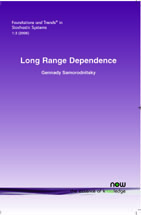Long Range Dependence
By Gennady Samorodnitsky, School of Operations Research and Information Engineering and Department of Statistical Science, Cornell University, USA, gennady@orie.cornell.edu
Abstract
The notion of long range dependence is discussed from a variety of points of view, and a new approach is suggested. A number of related topics is also discussed, including connections with non-stationary processes, with ergodic theory, self-similar processes and fractionally differenced processes, heavy tails and light tails, limit theorems and large deviations.
Long Range Dependence
Long Range Dependence is a wide ranging survey of the ideas, models and techniques associated with the notion of long memory. It begins with a historical survey going back to W. Hurst and the Nile river data, and goes on to discuss the various traditional and new points of view on long range dependence. These include connections with non-stationary processes, with ergodic theory, with self-similar processes and with fractionally differenced processes. The survey considers the implications of long memory on stochastic models with heavy tails and light tails, on processes defined as stochastic integrals, single and multiple, on limit theorems and on large deviations. Long Range Dependence will serve as an invaluable reference source for researchers studying long range dependence, for those building long memory models, and for people who are trying to detect the possible presence of long memory in data.
